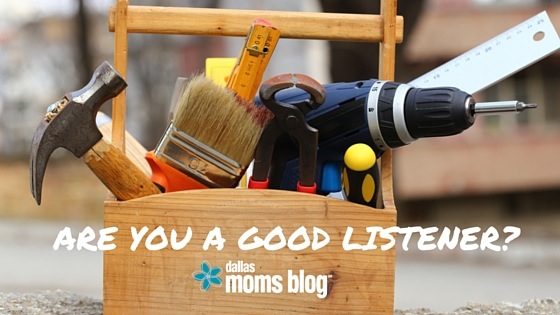 Most good relationship books I’ve read have had at least some instruction on communication. More specifically, the topic of listening to your partner has really stuck with me. It turns out, when people share their problems, they usually aren’t looking for you to take over and fix everything. Most people share their problems because they want to feel known and loved.
Most good relationship books I’ve read have had at least some instruction on communication. More specifically, the topic of listening to your partner has really stuck with me. It turns out, when people share their problems, they usually aren’t looking for you to take over and fix everything. Most people share their problems because they want to feel known and loved.
This goes beyond partner relationships into friendships and even parent/child relationships. Often, it’s difficult to really listen to a person without jumping into “fix-it” mode. We have good intentions. We want to make the pain go away. But the key to listening well isn’t solving the problem: it’s hearing and reflecting the emotion behind the problem while assuring the person we are listening to they are loved and valuable.
Here are some common knee-jerk reactions to avoid when your child shares a problem with you. I’ll use the example of a problem my child shared with me recently that they weren’t invited to a birthday party.
DON’T . . .
Minimize their feelings: Don’t be so sad! This happens to everyone sometimes. It’s really not a big deal.
Immediately offer solutions: You should ask your friend why he didn’t invite you. You should stop talking to him.
Ask a ton of detailed questions: How has he been acting lately? Was anyone else not invited? Where was the party?
Criticize the other people involved: I knew he was a jerk. I can’t believe you were ever friends with him.
DO . . .
Identify the feeling behind the problem: (some common ones are anger, fear, disappointment, jealousy, rejection, sadness, frustration, and embarrassment) You feel sad and left out because you weren’t invited.
Empathize: I’ve felt left out before and it’s really not fun.
Thank them for trusting and sharing with you: I’m glad you could tell me about this. I care about how you feel and what happens to you.
Ask them if they want to share any ideas about what to do next: They may or may not share any solution scenarios they’ve thought of.
While the above example is more likely for an older child, this type of listening works with any age. If a 2 year old is failing to put a puzzle together and slams it down in anger, that’s the problem she’s sharing with you! Before rushing into fix-it mode (give me that I’ll do it, stop throwing a fit it’s only a puzzle, etc) we can reflect the toddler’s feelings and help them feel understood and loved. You’re frustrated because that puzzle isn’t going together the way you want it to. Listening doesn’t replace training or discipline, but it’s a step we often completely miss in our rush to make the problem go away.
Actively listening in order to reflect feelings and show love to people is not the most natural thing in the world. I’ve found that I have to be very intentional about it. Even when I’ve thought about it I still forget and jump into fix-it mode many times. And frankly, my kids’ problems don’t even seem like a big deal half the time. (Try paying a mortgage, kiddo!) But their problems are a big deal to them, and by listening to their feelings I’m saying “you matter to me, and I want to understand you better.”
As a bonus, the more we actually listen and reflect/name emotions for our kids, the more emotionally intelligent and aware they become. I’m also hoping that the more I listen, the more likely they will keep sharing their feelings with me, even as we are now entering the teen years.
The next time someone tells you about a problem, especially your child, check yourself to see if you automatically jump into “fix-it” mode. If you do, you’re totally normal! But you might want to take a breath and think about hearing the emotion behind the problem. What is that person feeling? Can you acknowledge it and help them feel understood? How is it different to reflect emotion without trying to solve the problem? Do you see a sigh of relief or gratitude on the other person’s face because they know you “get them?”
I’m not saying we should never offer our opinion or help a child solve a problem. I just don’t want to miss out on an amazing opportunity to really connect with others by actively listening to and reflecting their emotions.













